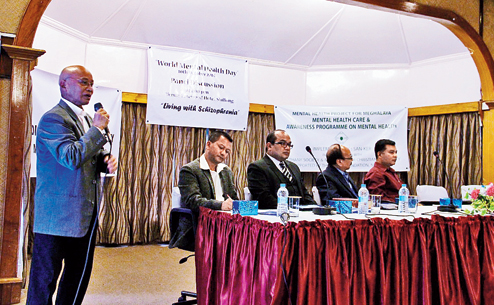 |
| Dr Sandi Syiem, director, SAN-KER, speaks at the panel discussion in Shillong on Friday. Picture by UB Photos |
Shillong, Oct. 10: The mental health policy was unveiled in New Delhi today by Union health minister Harsh Vardhan. In Meghalya, psychiatrists opined that such a policy could encourage patients with psychiatric illness to come out of denial and combat the stigma in order to receive timely treatment.
Unveiling the policy on World Mental Health Day, Vardhan said universal access to mental health care is a specific goal of the government, and said the policy would find substantial articulation in the evolving national health policy and the National Health Assurance Mission.
This year’s World Mental Health Day is on the theme Living with Schizophrenia.
“I visited the famous Institute of Mental Health and Hospital in Agra in preparation for the launch of the national mental health policy. I have promised it fresh funds for modernisation and expansion. Similar funds will be given to all hospitals in the country to enable them to open departments for treating patients in need of psychological and psychiatric healthcare,” the Union minister promised.
Funding is just one aspect of the policy, which is significant especially when there has been little or no funding for the treatment of psychiatric patients.
The policy’s objective is to provide universal access to mental healthcare by enhancing understanding of mental health and strengthening leadership in the mental health sector at all levels. It will have a pro-poor orientation because “only the creamy layer of society has access to mental healthcare in India today”.
Vardhan said the policy, which is backed by the Mental Health Action Plan 365, clearly spells out the specific roles to be played by the Centre, state governments, local bodies and civil society groups.
Apart from the policy, the NDA government will also table a Mental Health Bill in Parliament. The earlier effort made in 1987 ran aground because of a number of defects, the Union minister said.
“This time, a policy group worked dedicatedly to develop its recommendations. I thank them for recognising that the vast majority of the mentally ill people in India live in the villages and there is literally no care available for them,” he said.
While the country has only about 3,500 psychiatrists, the World Health Organisation has predicted that nearly 20 per cent of India’s population would suffer from some form of mental illness by 2020.
Moreover, he pointed out that earlier laws governing the mentally ill like the Indian Lunatic Asylum Act, 1858, and Indian Lunacy Act, 1912, “ignored the human rights aspect and were concerned only with custodial issues.
“After Independence, it took 31 years for India to attempt the first enactment, which resulted another nine years later in the Mental Health Act, 1987. But because of many defects in this act, it never came into force in any of the states and Union Territories,” Vardhan said.
Reacting to the development, psychiatrist Pakha Tesia, who is a consultant psychiatrist at NIMHANS, Bangalore, said all along the country and states never had any proper policy on mental health.
“There should be legislation to direct us to take proper care as many patients are treated inhumanly while many don’t get proper mental healthcare. While for other illnesses like blindness, the government has earmarked specific programmes, there has been no such thing for mental health,” Tesia said.
He said a policy like the mental health policy would ensure that people would avail of the treatment that is available around them, and treatment would be streamlined.
Lamenting about the lack of awareness about mental health, he said very few know what mental health is all about. Over and above, the question of stigma surrounding patients with mental illness is high, he said.
“Parents usually ask how their child could have mental illness. But for other illnesses, the patients go for treatment without any stigma. Even most of the insurance companies do not cover patients with mental illness. That is the discrimination they (patients with mental illness) face,” he said.
Talking about Meghalaya, he said the treatment facilities are good compared to other northeastern states, barring Assam. Shillong does not lack good psychiatrists. He cited SAN-KER, Meghalaya’s only private institute for mental health, which is being run by well-known psychiatrist Sandi Syiem.
Stating that mental illness is more prevalent among youths who are into alcoholism and substance abuse, he said schizophrenia is a major challenge here.
“In every 100 people, there is at least one individual who is suffering from schizophrenia. There could be around 40,000 or more people who are inflicted with schizophrenia. In every household, there is at least one psychiatric patient. As far as treatment is concerned, there is only one psychiatrist who has to cater to a population of 2-3 lakh people,” Tesia said.
While the police records on the number of persons who have allegedly committed suicide because of mental illness are less alarming, Tesia said the suicide tendency is more prevalent among those in the 20-35 age-group. In 2013, there were seven cases of suicide in Meghalaya, allegedly committed by those suffering from mental illness. Five of them were men. In 2012, the number was two (both men), while in 2011 the figure was 12, including seven women.
Tesia said people have to be made aware of psychiatric illness with stress that the brain, which is the most important function of the body, can also fall ill.
Another psychiatrist, Rica Lamar, said patients should have greater accessibility to ethical treatment while the existing services should be improved. Apart from the rehabilitation of mentally ill patients, she said reduction of stigma and discrimination against psychiatric patients should be prioritised.
Nagaland programme: Observation of World Mental Health Day in Nagaland today emphasised the need to conduct more programmes to create awareness on mental diseases so that the stigma attached to it could be curbed, adds PTI.
“There is a need to create awareness on social acceptance of mental diseases because unless awareness is created among the people, the stigma attached to mental diseases would continue,” said G. Kemp, principal director of health and family welfare department, Nagaland.
Speaking on the occasion, P. Ngully dwelt on the signs and symptoms of schizophrenic patients. He said there should be empathy towards the sufferers and that family participation should be an integral part of the treatment. “Schizophrenia is a manageable disease and awareness should prevail,” he said.










